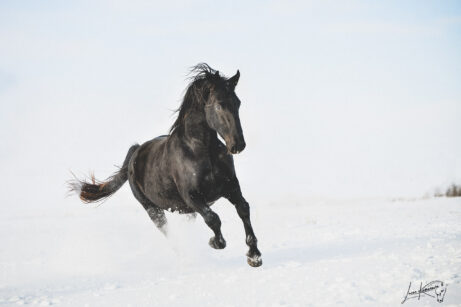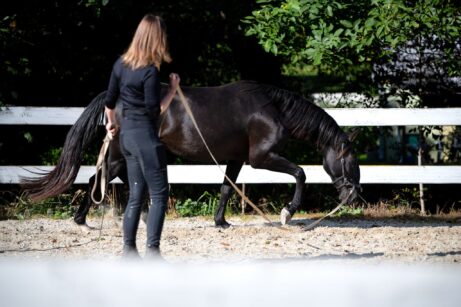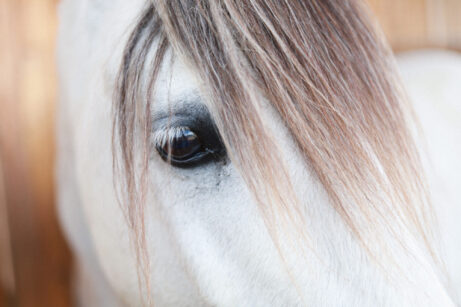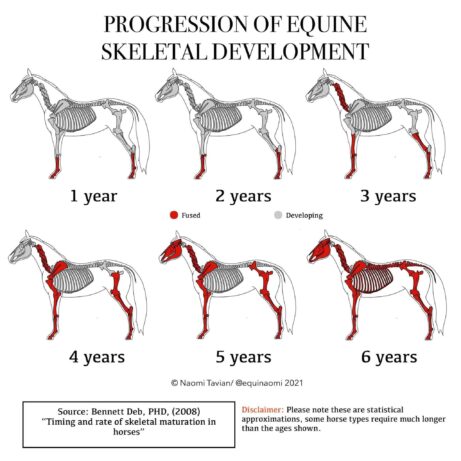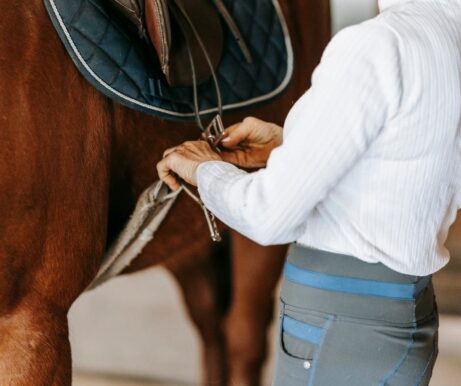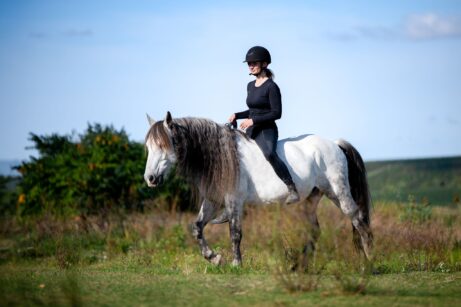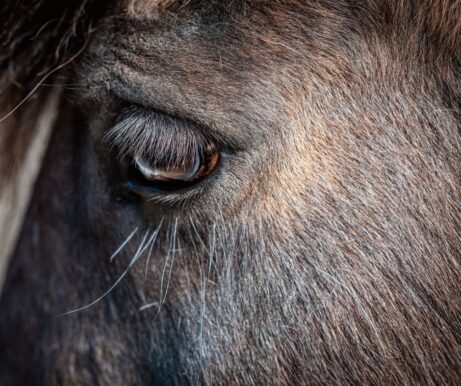How Much Does Your Ego Weigh?
The topic of rider's weight is more than just controversial. Discussions on social media often become passionate, filled with clever (and more often nonsensical) arguments. Let's approach this subject as objectively as possible, using common sense and avoiding excessive emotion. I want to preface this by saying that it's not my intention to offend or upset anyone. We all make decisions about our own bodies, and if you're comfortable with being overweight, that's perfectly fine. Just please choose a different activity than horseback riding. Remember, one's freedom ends where another's rights begin. And horses should have the right to fair treatment.

Horses Were Not Created for Riding
The fundamental premise that we, as conscientious riders, should start with is that horses did not evolve to be ridden. Their backs were not designed to carry a rider's weight over millions of years of evolution. While horses have been selectively bred for riding purposes over the past few thousand years, it's more accurate to say that we've selected horses that can tolerate a rider's weight. It's an undeniable fact that the less weight a horse carries on its back, the better.
We must understand that using horses for riding does not benefit them, and I dare say most horses don't enjoy it. They tolerate it; they tolerate us. Riding on their backs is an act of selfishness on our part, where we prioritize our interests and pleasures over those of the horses. I write this as someone who still rides horses, for now. I consider it extremely important for us riders to be aware that our riding activity causes more harm than good to the horse. We owe them an enormous debt, which we should repay at least through superb management, expert care, and 100% attention to their needs. And of course, we should not overload them beyond a reasonable limit. Horses are not tools; they are living beings capable of thought and feeling.
How Much is Too Much?
Recently, discussions have opened up about the appropriate weight ratio between rider and horse. I would rather call it the "tolerable" ratio. Because essentially, any weight on a horse's back is harmful. The lower this percentage ratio, the better. To illustrate, let's use concrete numbers. My horse Gallardo weighs 500 kg, I weigh 65 kg, which is 13% of his body weight. Personally, I've set a limit of 70 kg (14%) above which I don't allow riders to mount Gallardo.
A 2008 study from Ohio University examined what ratio of horse to rider weight is still bearable for the horse. It concluded that the threshold is 20%. However, if we apply this to my specific example, it would mean that according to the study, I could weigh up to 100 kg and still be tolerable for my horse. This number seems completely unrealistic and quite shocking to me. Moreover, the study doesn't address the long-term effects of such weight on a horse's back, let alone any sport or performance training. The conclusions I personally find more valuable are as follows:
- The study revealed that the horse's conformation has a significant impact on its ability to tolerate rider weight. Horses with wider loins, broad cannons, well-muscled backs, good balance, and lower center of gravity (like Quarter Horses or Hucul ponies) coped best with weight.
- A crucial factor in a horse's ability to tolerate rider weight was its fitness, inherent balance, and muscled topline.
- The duration and intensity of riding, as well as the quality of the surface the horse moves on, are also significant factors.
- A well-fitting saddle and proper hoof care are necessities.
Interesting studies from April and March 2019 (The influence of rider:horse bodyweight ratio and rider-horse-saddle fit on equine gait and behaviour: A pilot study, S. Dyson, A. D. Ellis, R. Mackechnie-Guire, J. Douglas, A. Bondi, P. Harris) examined the impact of rider weight on weight distribution in the saddle and the horse's musculoskeletal system (lameness or pain manifestations). Scientists divided riders into groups based on weight (see image): light (>10 ≥ 12%), medium (>12 ≥ 15%), heavy (>15 ≥ 18%), and very heavy (>18 ≥ 20%). These riders were tasked with performing a 30-minute dressage test, during which pressure points on the saddle, the horse's musculoskeletal system (signs of lameness or pain), and rider position were monitored.

None of the 13 riders in the "heavy" and "very heavy" categories completed the test, as the horses showed signs of lameness or pain. One rider out of 12 in the "medium" category also failed to finish. Additionally, riders in the "very heavy" category didn't fit properly in the saddle, spilling over the cantle. "Heavy" category riders sat too far back, almost on the cantle. Leaning on the cantle transfers disproportionate pressure to the horse's loins, negatively impacting its musculoskeletal system. Overweight riders essentially cannot sit in a well-fitting saddle, as saddles large enough to accommodate obese riders don't fit horses properly. Studies also showed that horses under heavy riders temporarily limped and exhibited pain-related behaviors.
Popular Arguments
"But in medieval times, horses carried knights in full armor just fine!" This one is quite common. I'm not aware of many studies on medieval knights' horse welfare, so referring to how "fine" the horses managed seems comical at best. Not to mention that welfare standards for both horses and humans in medieval times were undoubtedly very different from today's. Ethically, we should strive to be at least a bit more advanced, shouldn't we?
"What about a big, muscular guy who weighs 90-100 kg but isn't fat?" That's true, such a man certainly isn't fat. On the other hand, it's not written anywhere that absolutely everyone has the right to ride a horse. If we go to the core of the issue, none of us has an ethical entitlement to riding; it's our selfish desire to satisfy our wishes. Nevertheless, we should keep these cravings within reasonable limits. Just imagine: if a 100 kg person insists on crossing a bridge with a 50 kg weight limit, they'll likely damage the bridge and possibly injure themselves. I believe that horseback riding (especially competitive riding) is simply not suitable for large muscular men (let alone overweight individuals) or women who weigh as much as large muscular men. Sorry, but it's not fair to the horses.
"It's not about weight, but about the rider's seat!" Even the Ohio University study mentions that riders who could sit in balance were easier for horses to carry. However, a rider's ability to work with their body doesn't necessarily make them a lighter load. And beware, even a light trot and so-called "lifting off the horse's back" by standing in the stirrups doesn't solve the situation. The rider's weight doesn't disappear; it doesn't lighten the load on the horse. To rise in the saddle, the rider must push down on the stirrups and overcome gravity, so the force exerted on the horse is actually greater rather than less. Moreover, as mentioned earlier, heavier riders rarely fit optimally into saddles.
Two Types of Riders
We can distinguish two basic types of riders: those who love horses, and those who love riding horses. Riders who love horses put the interests and welfare of horses before, or at least on par with, their own. These riders understand that it's not ethical to ride horses if they are overweight. They're willing to pause riding for a while or monitor their weight. The second group of riders, those who love riding horses, will argue that horses can handle it, that their horse doesn't mind, and that we, critics of heavy riders, are hysterical and oversensitive. Unfortunately, rational arguments often fail with these riders.
I think very few people are actually happy about being overweight. It's a very sensitive topic, painful for many. I understand this and can relate, having consistently dealt with my own weight for the past 30 years. I realize how challenging it is to activate willpower, maintain motivation, avoid comfort eating due to sadness and stress, break deeply ingrained patterns, resolve old traumas, and change lifestyle. But we should undertake this not only for the horses but also for ourselves. The first step is to accept responsibility for ourselves and our actions. Weight doesn't just "happen" to us, it's rarely "genetic from the family"; more often, the whole family suffers from poor habits. Only a very small percentage of overweight people can't help it due to some illness. For the rest, it's mainly in the mind.
To Conclude
Being a slim rider is, of course, absolutely ideal. Some people are naturally "gifted" and it doesn't require any effort from them. We can only congratulate such riders. For the rest of us who constantly struggle with weight, it's a great lesson in personal development, the art of self-love, and hard work towards a healthy lifestyle.
To heavy and obese riders, I wish you strength, willpower, and self-awareness. We can only change what we acknowledge. If you truly love your horse, it should be your best motivation.
Source
The influence of rider:horse bodyweight ratio and rider-horse-saddle fit on equine gait and behaviour: A pilot study,
S. Dyson, A. D. Ellis, R. Mackechnie-Guire, J. Douglas, A. Bondi, P. Harris
First published: 31 March 2019
https://doi.org/10.1111/eve.13085
Read more
